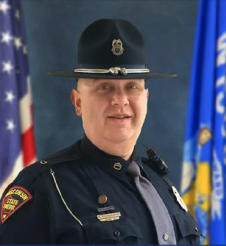 While on a camping trip with his family, Kristofer “Kris” Mondloch, Wisconsin-Platteville ’02, thought he was off duty for the weekend. As a 14-year veteran in the Wisconsin State Patrol, he is well trained on life-saving techniques and helping those in need, but didn’t expect to use those skills while out for a bike ride with his family.
While on a camping trip with his family, Kristofer “Kris” Mondloch, Wisconsin-Platteville ’02, thought he was off duty for the weekend. As a 14-year veteran in the Wisconsin State Patrol, he is well trained on life-saving techniques and helping those in need, but didn’t expect to use those skills while out for a bike ride with his family.
Mondloch and his kids were tooling around the campground when a man flagged them down seeking a doctor or assistance to help a woman who was “down and not breathing.”
Without hesitation, Mondloch hopped off his bike, approached the scene and could see the woman lying on her back on the deck of her camper. Leaning on his training, he immediately checked her vital signs. She was “barely breathing” and had a faint pulse, so Mondloch started chest compressions while another camper called 911.
“We are trained to do that, and so I didn’t really think about it,” he said about springing into action. “But it was surreal when I looked up and my kids were sitting there 50 feet away.”
As a first responder arrived on the scene with an automated external defibrillator, Mondloch delivered a shock – as instructed – that re-established the woman’s heart rhythm and pulse. Emergency medical service personnel then arrived and quickly transported her to the hospital.
The woman survived the September 2019 incident, and Mondloch’s sergeant sought to recognize him for his selfless work, that to him, is simply “what you do.” Mondloch was named the recipient of the Lifesaving Award as part of an annual recognition ceremony with the Wisconsin State Patrol. However, because of the COVID-19 pandemic, the event that would have happened in fall 2020 was postponed. He was finally honored in a virtual ceremony this February.
Mondloch has been in law enforcement for the last 18 years, a career he studied for in college while a member of the Wisconsin Theta chapter.
“My mom was a nurse, and I grew up in a family that valued public service,” he said.
A founding father of his chapter, he served on the executive board and attributes the communication skills he developed in the Fraternity as critical to his role today.
“The people skills that you develop in the Fraternity – through recruiting, leadership or the experiences in college that SigEp allotted to me – go a long way in my profession,” he said. “The better you are at talking to people, the more effective you are … the easier it is to do my job.”









Leave a Reply